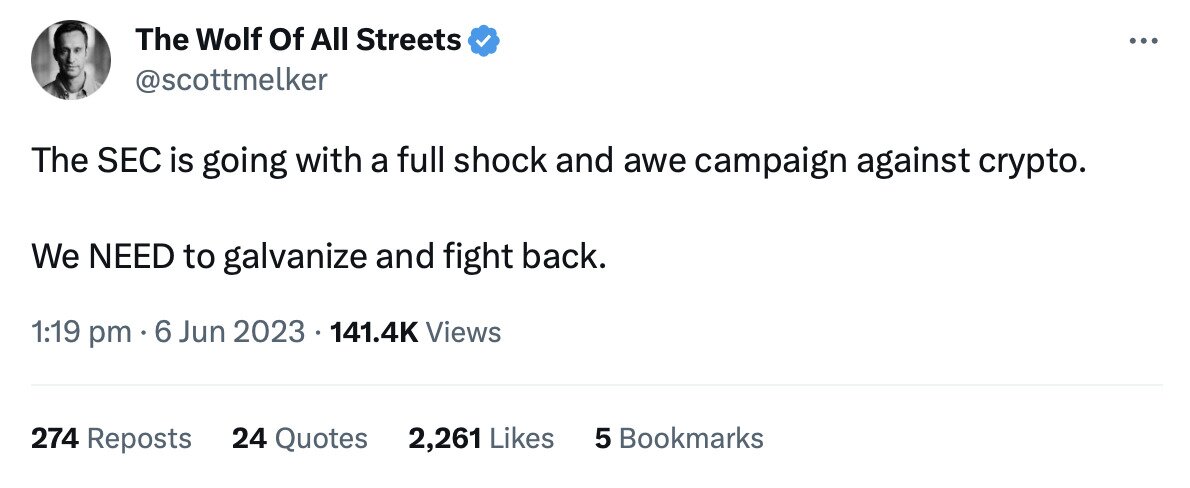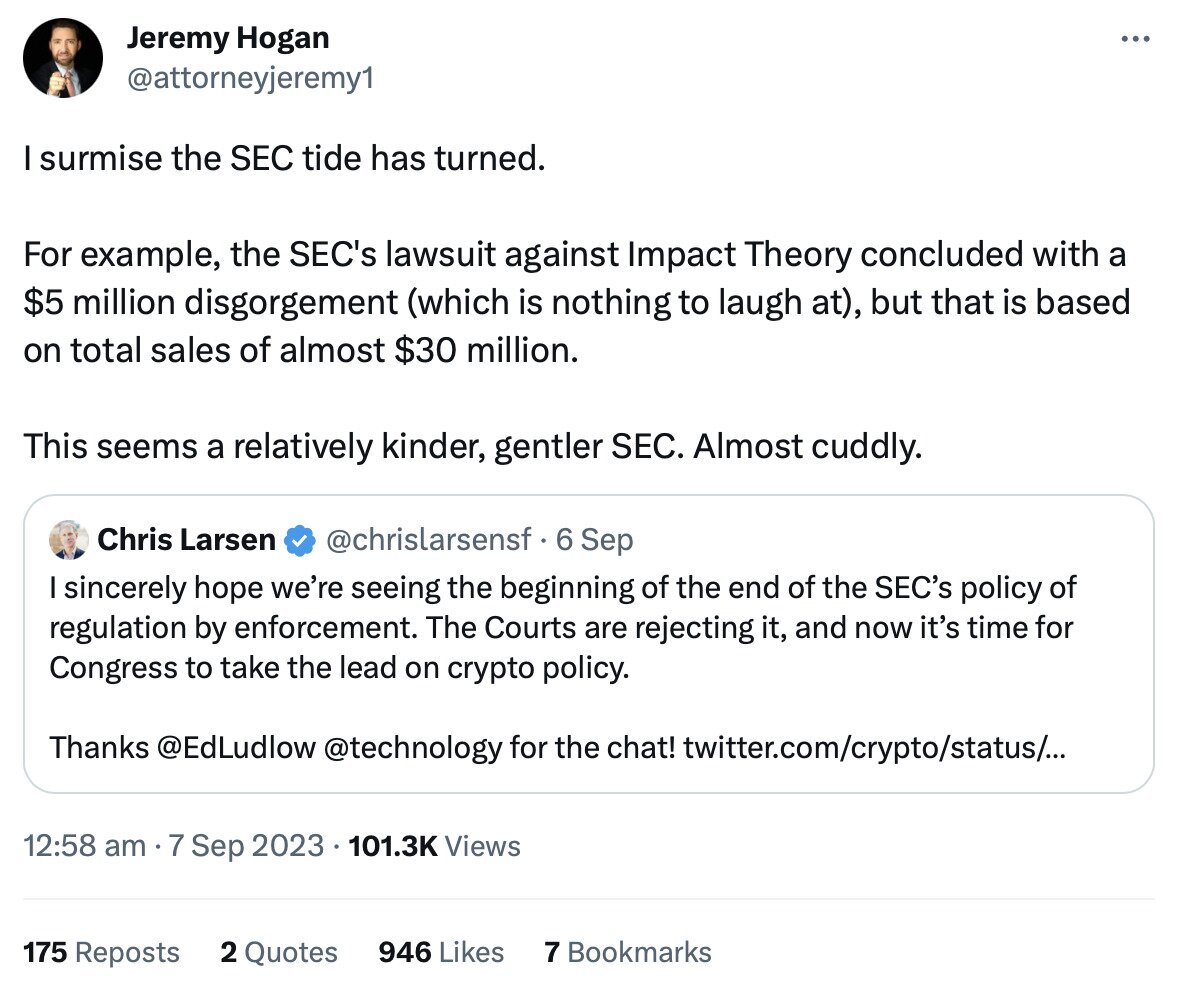- >News
- >The SEC Keeps Losing in Court, Will It Find a New Target or Wave the White Flag?
The SEC Keeps Losing in Court, Will It Find a New Target or Wave the White Flag?
2023 may not have been an especially vintage year for crypto, but it also hasn’t been a particularly great one for the Securities and Exchange Commission. Sure, the US securities regulator may have launched legal actions against Binance and Coinbase in June in an apparent show of strength, yet it has also lost in key rulings in two other high-profile cases.
Taken in chronological order, the first of these cases centered around its long-running battle with Ripple, which in July resulted in the judge ruling that, in and of itself, XRP is not a security. And then at the end of August a different judge ruled that the SEC had been unlawful in rejecting Grayscale’s application to launch a spot Bitcoin ETF, with the regulator being required to review the asset manager’s application in full.
Both of these decisions came as a significant blow for the SEC and as a boost for the cryptocurrency industry. But with the regulator still pursuing its cases against Binance and Coinbase, and with it still largely of the opinion that pretty much all cryptocurrencies – save Bitcoin – are securities, it’s clear that it won’t stop its crusade against crypto until decisive decisions are made and also codified into US law.
US Legal System Blunts SEC’s Power Grab
It’s pretty clear that what the SEC has been doing in the past few years, but particularly in the past few months, is testing the extent of its jurisdiction over the cryptocurrency market. Or to put it differently, it has been engaged in a power grab over crypto, hoping that its claims will stick in court and thereby set legal precedents for its role in policing the market.
Scott Melker tweets after the SEC sues Coinbase on June 6. Source: Twitter
This is not only apparent in the regulator’s infamous case with Ripple, but also with its more recent cases against Coinbase, Binance and other cryptocurrency exchanges and firms. Indeed, the case against Coinbase is particularly instructive, with CEO Brian Armstrong claiming at the end of July that, prior to its legal action, the SEC asked the exchange to halt trading in all cryptocurrencies, except for BTC.
Regardless of whether the SEC has it in for all cryptos save for BTC, its filings against Coinbase and Binance make it clear that it wants to assert its right to police as much of the market as possible. Indeed, the SEC has explicitly labeled well over 60 cryptocurrencies as securities, with its current Chairman, Gary Gensler, also having said that he thinks pretty much every crypto bar BTC is a security.
Such aggression on the part of the SEC has been a big part of the reason why the cryptocurrency market has struggled so much this year, with prices still down by around 65% since reaching a peak in November 2021. Yet as aggressive as the regulator has been in past months, it now seems that other elements of the legal structure in the United States are beginning to turn against it, in the sense of opposing or striking down its claims.
For instance, in opposition to the SEC’s argument that XRP is a security, Judge Analisa Torres ruled in mid-July that “XRP, as a digital token, is not in and of itself a “contract, transaction[,] or scheme” that embodies the Howey requirements of an investment contract.” Likewise, the Grayscale ruling from August saw the presiding court conclude that the regulator was “arbitrary and capricious” in rejecting the asset manager’s application because it “never explained why Grayscale owning bitcoins rather than bitcoin futures affects the CME’s ability to detect fraud.”
Such court rulings have undermined the SEC’s attempts to establish itself as the final word on what the industry can and can’t do. Yet they have also given credibility to claims that the regulator is overreaching in an attempt to seriously impair (or even destroy) crypto, doing so in order to protect the interests of the financial industry and/or to “pave the way for a CBDC.”
Who Next?
But if recent losses for the SEC have weakened it in its attempts to hobble the cryptocurrency industry, what is it likely to do next? Will it concede defeat and allow the cryptocurrency industry in the US (and elsewhere to continue as before)? Or will it continue finding new targets to sue, so that hopefully it will secure a victory that will stick?
Well, the first thing it’s going to do is continue pursuing the cases in which it’s currently embroiled. This includes its high-profile actions against Coinbase and Binance, both of which it sued in June on counts of operating unregistered securities exchanges, among other alleged violations.
Given that cryptocurrency legislation still remains mostly uncharted territory, it’s hard to say how either of these cases will end up. Nonetheless, it remains plausible to assert that things will be a little less difficult for Coinbase, which is facing fewer charges than Binance and which appears to be taking a more aggressive, proactive stance in its defense. And in addition to charges related to selling unregistered securities, Binance also faces charges concerning trading controls and misappropriation of customer funds, something which may result in a much worse outcome for the larger exchange (by reported trading volume).
That Binance could be a big – and realistically defeated – target for the SEC is also suggested by the wave of executive departures it has suffered in recent months, as well as by numerous withdrawals of license applications in various jurisdictions (e.g. Germany). These all suggest that not everything is quite right at the world’s largest exchange, and that it may be vulnerable enough for the SEC to secure a victory.
And even if Binance and Coinbase weren’t in the picture, it’s clear that the SEC isn’t going to stop in its efforts until it has exhausted every possible legal avenue. Take its case with Ripple, which is currently at a stage where the SEC is seeking to file an interlocutory appeal against certain aspects of the judge’s ruling.
Source: Twitter
Having said that, some observers believe that the regulator is likely to take a comparatively softer approach from here on out, and leave behind (to an extent) regulation by enforcement. On top of this, moves have been made in recent months within the US Congress to reform the SEC, with various lawmakers critical of how it has arguably overreached when it comes to crypto.
It’s not clear whether such moves will be successful, but they may at least have the effect of warning the SEC away from being too overzealous in its approach to crypto. But for now, the regulator will at least see out its ongoing actions against Binance, Coinbase and other exchanges, a process which could take one or two years to conclude, if the Ripple case is anything to go by.




